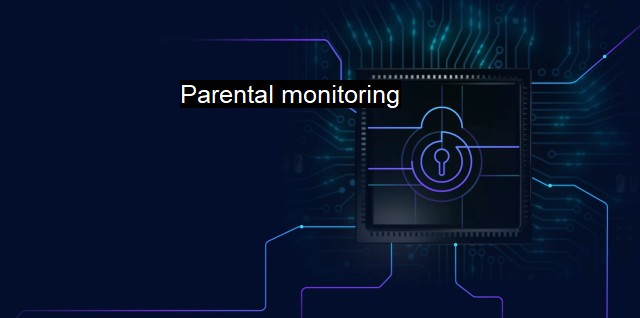What is Parental monitoring?
The Importance of Parental Monitoring in the Digital Age: Protecting Children from Online Threats
Parental monitoring in the context of cybersecurity and antivirus protection is a set of measures parents implement to protect their children online and to ensure they have a healthy, safe, and age-appropriate digital experience. With an increasing number of children using the internet on their own devices, parental monitoring has become a significant aspect of cybersecurity practices in the modern world.Parental monitoring works on several fronts to maintain children's online safety. This includes monitoring internet usage, supervising online activities, setting rules for online behavior, installing antivirus and other cybersecurity software, conditioning children on the importance of data privacy, and teaching safe browsing and interaction habits.
The aspect of monitoring internet usage generally involves the use of parental controls provided by various platforms like search engines, video streaming websites, social media platforms, and others. These controls enable parents to set what kind of content their children can access and limit the overall time spent on the platforms. Being able to block adult content, violent media, or offensive literature from your child's access makes the online world a significantly safer place for them.
Apart from parental controls exist on individual platforms, there are dedicated monitoring software and applications such as NetNanny, Bark, and others. These applications offer a host of features including real-time alerts for potentially harmful online activity, setting screen time, managing applications, location tracking, social media monitoring, among many others.
Installing reputable antivirus and cybersecurity software on children’s devices serves a two-pronged purpose. The first is obvious, to offer protection from malicious programs, malware, phishing attacks etc. The second, is that most advanced antivirus programs also come loaded with a suite of parental controls as a part of their broader cybersecurity strategy. This can often extend to enabling parents to set time limits, block websites, monitor online transactions, etc.
One of the critical aspects overlooked when discussing parental monitoring is the importance of conditioning children about their data privacy. Children should understand the type of personal data they should never share online, like their addresses, phone numbers, or info about daily routines. Parents need to teach them to be cautious while dealing with pop-ups, online friend requests, and emails from unknown sources.
While technology provides the means for us to navigate cybersecurity hazards, it still comes down to teaching children safe online habits. These could include using strong, unique passwords, exercising digital etiquette, not clicking on suspicious links, not sharing suggestive photographs, and many such habits that are fundamental to ensuring they do not inadvertently expose themselves to untold cyber risks.
Constraints of parental monitoring do exist, including breaches of trust, the potential for it to become invasive, and not addressing the root causes of why children engage in risky online behavior. Parents need to discuss these concerns openly with their children to establish monitoring in a more collaborative, rather than authoritative approach.
While parental monitoring refers primarily to parents taking responsibility for their child’s online safety, it also requires wider discussions about corporate responsibility in protecting young users. This means pushing companies to prioritize children’s safety within their platforms, like stringent default settings and more sophisticated control options for parents.
Parental monitoring in the context of cybersecurity and antivirus becomes a holistic approach to ensure children's safety online. It is not merely about restricting access; instead, it's about creating a digital environment that's supportive, educational, and where the risk of malware and other forms of cyber misuse is minimized. It also allows us to nurture a self-regulating, responsible generation of internet users flowing naturally into a digital future armed with the best defenses.

Parental monitoring FAQs
What is parental monitoring?
Parental monitoring is a method of tracking and regulating the online activities of children, particularly their use of the internet and social media. It is a process by which parents or guardians manage their kids' digital behavior, ensuring they remain safe and secure online.Why is parental monitoring necessary in cybersecurity?
Parental monitoring is essential in cybersecurity because it helps in preventing cyber threats and cyberbullying. It also ensures that kids do not engage in risky online behavior or access inappropriate content, protecting them from harm or exposure to online predators.What are some parental monitoring tools that parents can use?
There are several parental monitoring tools that parents can use, such as Net Nanny, Norton Family, Qustodio, and Kaspersky Safe Kids. These tools offer features like website restriction, screen-time management, and social media monitoring, among many others.At what age should kids start being monitored by their parents?
Kids should be monitored by their parents from an early age, starting from when they first begin using digital devices like computers and smartphones. However, the level of monitoring may vary depending on the child's age and maturity level. For instance, younger kids require more active monitoring than older ones who may only need occasional supervision.| | A | | | B | | | C | | | D | | | E | | | F | | | G | | | H | | | I | | | J | | | K | | | L | | | M | |
| | N | | | O | | | P | | | Q | | | R | | | S | | | T | | | U | | | V | | | W | | | X | | | Y | | | Z | |
| | 1 | | | 2 | | | 3 | | | 4 | | | 7 | | | 8 | | |||||||